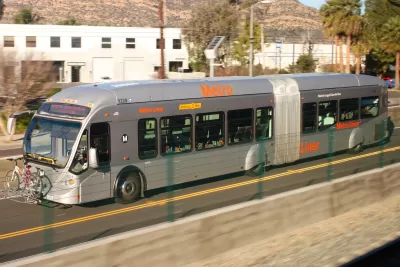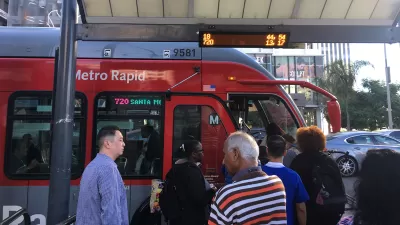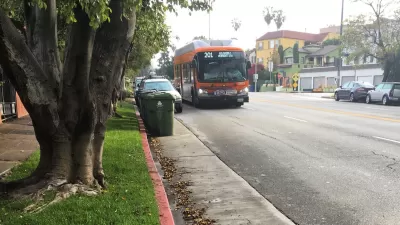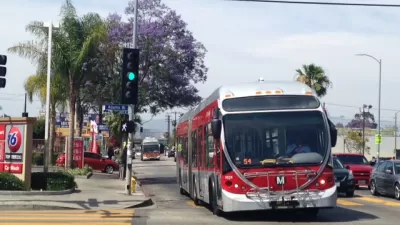Metro is analyzing new geolocational data to look beyond conventional understandings of travel behavior.

Adam Rogers reports on efforts at the Los Angeles County Metropolitan Transportation Authority to better understand how people travel and the ways bus service could be revamped to meet these needs and entice people to switch modes.
Using locational data from cell phones, Conan Cheung at Metro found the expected morning and afternoon peaks related to schools and work. But the data also showed a third peak, one that is not commute related, says Rogers:
That was new. "What we know from traditional surveys is, people remember their biggest trips," [Anurag] Komanduri says. "But what people forget is 'I'm picking up the laundry,' 'I'm stopping to grab coffee.' We see more of these data captured by cell phones." Those trips, the futzing around of daily life, tend to happen in off-peak hours—from midday into the evening, 8 or 9 o'clock.
A closer look at these short trips compared transit and driving trip times. "Some 85 percent of trips could be taken on mass transit, but fewer than half were as fast as driving," writes Rogers. And when more comparisons were made using fare card data, Cheung discovered that on routes with the same travel time, only 13 percent of that travel happened on transit.
The challenge, says Rogers, is figuring out how to use and balance the incentives for transit use and the disincentives for driving—the carrots and the sticks. Improving transit service, increasing housing density, and implementing congestion pricing are all strategies that can help get people out of their cars.
But he also argues that Los Angeles needs to take bold steps to stop designing the city around driving. "This is the baller move: Stop making cars easy and everything else hard. Tear down some freeways. Make retail districts pedestrian-only. Strew commercial corridors with curbside parklets, protected bike lanes, scooter-share services, and apartment buildings with first-floor retail and no parking. Make it illegal to park on the street—on every street. Put buses and trains everywhere."
FULL STORY: LA’S PLAN TO REBOOT ITS BUS SYSTEM—USING CELL PHONE DATA

Planetizen Federal Action Tracker
A weekly monitor of how Trump’s orders and actions are impacting planners and planning in America.

Map: Where Senate Republicans Want to Sell Your Public Lands
For public land advocates, the Senate Republicans’ proposal to sell millions of acres of public land in the West is “the biggest fight of their careers.”

Restaurant Patios Were a Pandemic Win — Why Were They so Hard to Keep?
Social distancing requirements and changes in travel patterns prompted cities to pilot new uses for street and sidewalk space. Then it got complicated.

Albuquerque Route 66 Motels Become Affordable Housing
A $4 million city fund is incentivizing developers to breathe new life into derelict midcentury motels.

DC Area County Eliminates Bus Fares
Montgomery County joins a growing trend of making transit free.

Platform Pilsner: Vancouver Transit Agency Releases... a Beer?
TransLink will receive a portion of every sale of the four-pack.
Urban Design for Planners 1: Software Tools
This six-course series explores essential urban design concepts using open source software and equips planners with the tools they need to participate fully in the urban design process.
Planning for Universal Design
Learn the tools for implementing Universal Design in planning regulations.
Heyer Gruel & Associates PA
JM Goldson LLC
Custer County Colorado
City of Camden Redevelopment Agency
City of Astoria
Transportation Research & Education Center (TREC) at Portland State University
Camden Redevelopment Agency
City of Claremont
Municipality of Princeton (NJ)





























